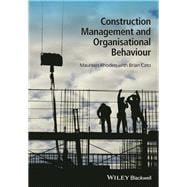
Note: Supplemental materials are not guaranteed with Rental or Used book purchases.
Purchase Benefits
Looking to rent a book? Rent Construction Management and Organisational Behaviour [ISBN: 9781118674819] for the semester, quarter, and short term or search our site for other textbooks by Rhoden, Maureen; Cato, Brian. Renting a textbook can save you up to 90% from the cost of buying.
Maureen Rhoden is Senior Lecturer in the Department of Built Environment at the University of Greenwich, London. She specialises in the study and teaching of soft skills in construction management in addition to supervising dissertations of undergraduate and postgraduate students researching in soft skills and construction management related Issues.
Brian Cato is Senior Lecturer in the Department of Built Environment at the University of Greenwich, London. He is a Chartered Quantity Surveyor and Project Manager with 30 years experience in the construction industry, 25 of them in private practice and latterly 5 years in education.
1 Introduction 1
Structure of the book 1
2 History of Management 3
Introduction 3
Scientific management 3
Classical theory 4
Human relations theory 6
The Hawthorne studies and human relations theory 8
Theory X and Theory Y 9
Decision theory 10
Work activity theory 10
Competencies theory 10
Process theory 10
Is management a science or an art? 10
Conclusion 12
Chapter summary 13
Useful website 13
Further reading 13
References 13
3 The Nature of Management 15
Introduction 15
The role of a manager 15
Contemporary management functions 18
The organisation’s expectations 21
The person 21
Balancing different management roles 22
Conclusion 22
Chapter summary 22
Useful website 22
Further reading 22
References 23
4 Leadership 25
Introduction 25
Behavioural theories 27
Situational leadership 28
Contingency theories 28
Individual leadership skills 30
Leadership styles 31
Changing leadership styles 36
Chapter summary 43
Useful website 43
Further reading 43
References 44
5 Communications and Motivation 45
Introduction 45
Motivation 49
What is motivation? 50
The process of motivation 50
Expectations from work 51
Barriers to motivational behaviour 51
Theories of motivation 52
Chapter summary 59
Useful websites 60
Further reading 60
References 60
6 Conflict and Negotiation 63
Introduction 63
Negotiation game plan 66
Receiving notification of a potential conflict 67
Win–win conflict negotiation 68
Negotiating a compromise position 69
Withdrawing from the conflict 70
Smoothing the conflict through negotiation 71
Chapter summary 73
Useful website 73
Further reading 73
References 73
7 Creative Problem Solving 75
Introduction 75
Bounded and unbounded problems 75
Solving problems 78
Messy, soft or wicked problems 79
Creative problem solving – individuals 82
Creative problem solving – teams 86
Brainstorming techniques for teams 87
Case studies 91
Selecting appropriate problem solving techniques 92
Chapter summary 92
Useful websites 92
Further reading 93
References 93
8 Managing Organisational Change 95
Introduction 95
Brief history of organisational change 95
Managing change 98
Triggers for organisational change 99
Determinist and voluntarist models 103
Perceptions of organisational change 104
Communicating organisational change 105
Employee interpretations of organisational change 106
Individual resistance to change 107
Transitioning nature of sites and project teams 108
Group interpretations of organisational change 109
Group resistance to change 109
Planned organisational change 110
Organisational development and change 113
The situational approach to change management 114
John Kotter’s model 115
Political influences and change management 117
Chapter summary 119
Useful websites 119
Further reading 119
References 120
9 Entrepreneurship and Innovation 125
Introduction 125
Characteristics of successful entrepreneurs 125
Work style 130
Leadership style 132
The entrepreneur as a leader 134
Innovation 135
Organisational culture 137
Disruptive innovations 139
Change for the sake of change? 140
Small enterprises 141
Chapter summary 143
Useful websites 143
Further reading 143
References 143
10 Organisational Culture 147
Introduction 147
Culture has vs culture is 148
Integration vs differentiation/fragmentation 149
Culture managed vs culture tolerated 149
Symbolic leadership vs management control 149
The iceberg model 150
Theories of organisational culture 153
Globalisation and cultures 161
Organisational socialisation 161
National cultures 163
Chapter summary 166
Useful website 167
Further reading 167
References 167
11 Organisational Strategy 169
Introduction 169
Stakeholders 171
Competitive advantage 174
Porter’s five forces 174
Organisational capability 175
The strategic loop 177
Strategic approaches in small firms 184
Chapter summary 184
Useful websites 185
Further reading 185
References 185
12 Organisations and Structures 187
Introduction 187
Theoretical models of organisational structure 190
Organisational design 196
The shamrock organisation 202
Situational factors 204
Chapter summary 205
Useful websites 205
Further reading 205
References 205
Index 209
The New copy of this book will include any supplemental materials advertised. Please check the title of the book to determine if it should include any access cards, study guides, lab manuals, CDs, etc.
The Used, Rental and eBook copies of this book are not guaranteed to include any supplemental materials. Typically, only the book itself is included. This is true even if the title states it includes any access cards, study guides, lab manuals, CDs, etc.